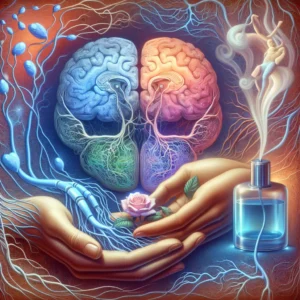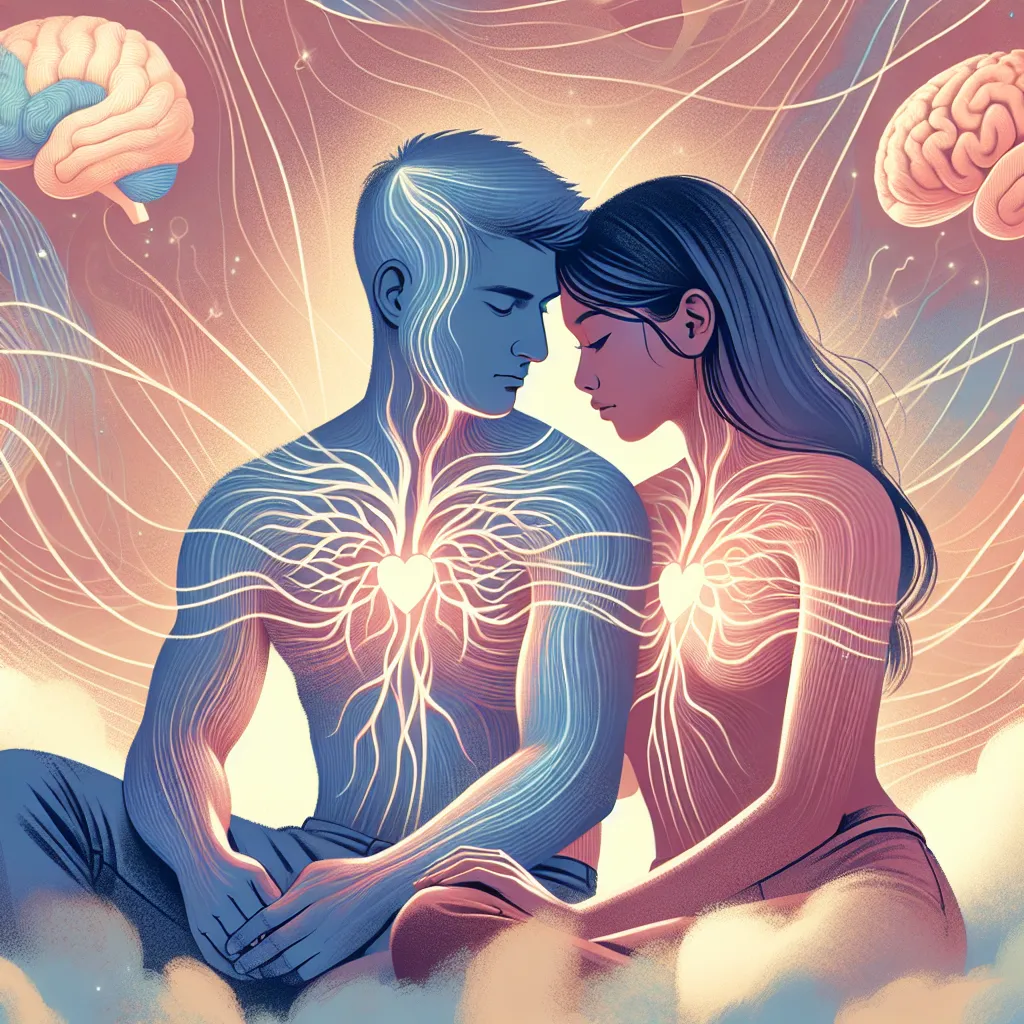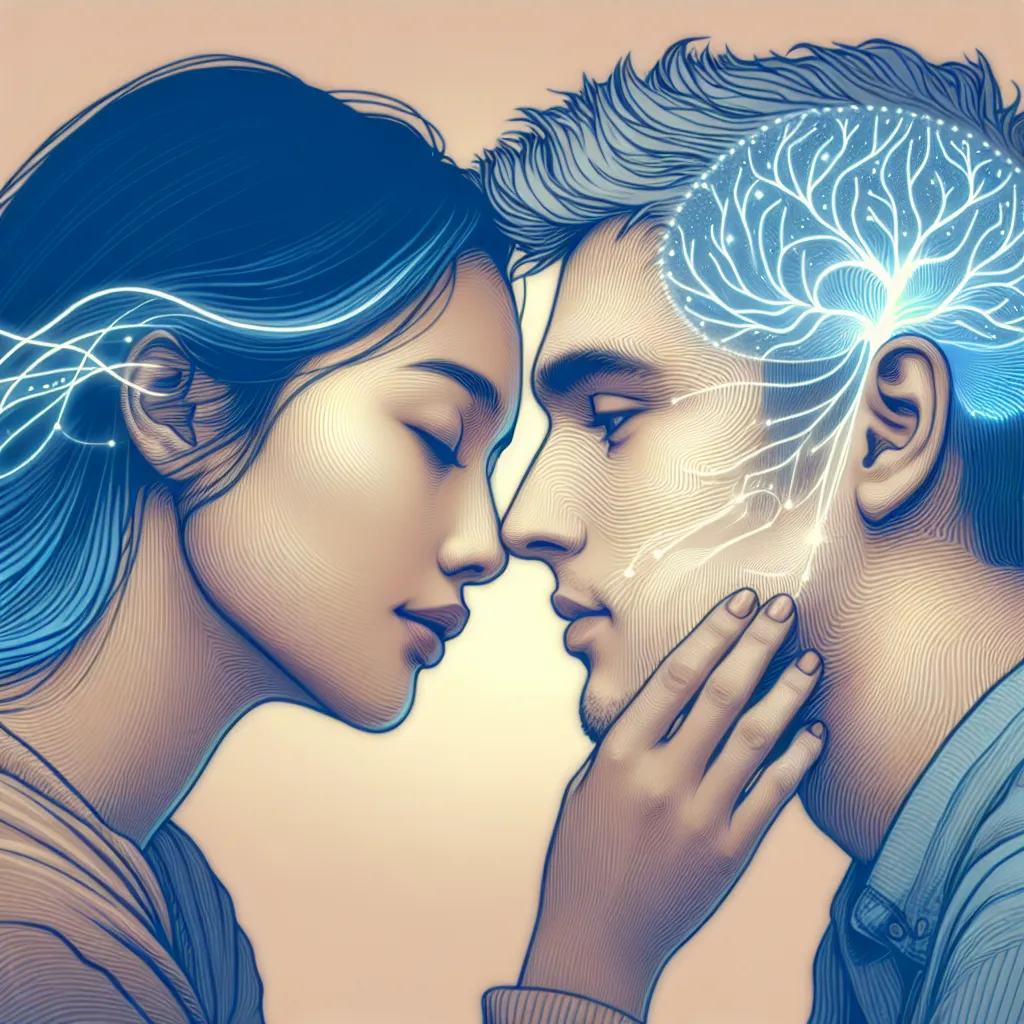Hello, relationship seekers!
Today, we’re diving deep into an intriguing question about relationships: “What neural mechanism makes a partner’s scent trigger vivid romantic memories?”
The Direct Answer
Neurologically speaking, the reason a partner’s scent can trigger vivid romantic memories is primarily due to the intimate relationship between our olfactory system (which processes scents) and the limbic system (which handles emotions and memories). The olfactory bulb, which starts in the nose and runs along the bottom of the brain, has direct connections to the amygdala and hippocampus, parts of the brain that are vital for emotion and memory respectively. This strong neural connection is why certain scents can trigger powerful emotional memories.
Now, let’s explore the extensive evidence and details that support this answer:
1. The Neurology of Smell and Memory
Understanding the neurology of smell and memory is essential to answering our question. The olfactory system is unique among our sensory systems due to its direct link to the emotional and memory centers of the brain.
A. The Olfactory System
The olfactory system is responsible for our sense of smell. It starts with olfactory receptors in the nose that send signals to the olfactory bulb.
– Expert Perspectives: Dr. Rachel Herz, a leading expert in the psychology of smell, explains, “The olfactory bulb is the only place in the whole brain where the outside world comes into direct contact with the central nervous system.”
– Psychological Research: A study by Savic et al. (2000) shows that the olfactory system can trigger strong emotional responses. This is because olfactory signals bypass the thalamus, which usually acts as the ‘gatekeeper’ for sensory information, and go directly to the amygdala and hippocampus.
– Real-World Examples: Think about how the smell of fresh-cut grass might bring back memories of playing soccer as a child, or how a particular perfume reminds you of a loved one.
B. The Connection to the Limbic System
The direct pathway from the olfactory system to the limbic system, which includes the amygdala and hippocampus, is key to understanding how scents trigger emotional memories.
– Historical Context: Ancient humans relied heavily on their sense of smell for survival. As such, the ability to quickly connect a scent with a memory (like associating the smell of smoke with danger) was an important survival mechanism.
– Common Challenges: Some people may find certain smells bring back traumatic or negative memories. This is due to the same neural mechanism.
– Practical Applications: Understanding this connection can help you use scents to evoke positive emotions or memories in your relationship.
C. The Specific Role of the Amygdala and Hippocampus
The amygdala and hippocampus play crucial roles in the emotional and memory-related responses to scents.
– Amygdala: This almond-shaped structure is involved in processing emotions. It’s especially tuned to handle fear responses, making it key to the emotional intensity of certain scent-triggered memories.
– Hippocampus: This structure is crucial for forming new memories, including those associated with scents. It’s why you might remember a specific event when you smell a certain fragrance.
2. The Psychology of Scent and Memory
Now let’s explore the psychological aspects of how scents can trigger vivid romantic memories.
A. Emotional Memory and Scent
Emotion and memory are closely intertwined, with scents often acting as powerful emotional memory triggers.
1. State-dependent memory: This psychological principle suggests that our ability to recall information is better when we are in the same physical or emotional state as when the memory was formed. If a particular scent was present during an emotional moment, that scent can trigger the memory of that moment.
2. Emotional intensity: The more emotionally intense the original experience, the more vividly it can be remembered when the same scent is encountered again.
3. Proustian Memory: Named after French writer Marcel Proust, this term refers to the vivid recall of memories triggered by sensory stimuli, especially scents. Proust famously described how the smell and taste of a madeleine cake dipped in tea evoked a torrent of childhood memories.
B. The Role of Individual Differences
Not everyone responds to scents in the same way, and individual differences can affect how scents trigger memories.
– Genetic factors: Some people may have a more sensitive sense of smell due to genetic factors, making them more likely to form strong scent-associated memories.
– Cultural factors: Different cultures have different attitudes towards and interpretations of various scents, which can influence the types of memories associated with these scents.
– Personal experience: Individual experiences also play a crucial role. For example, if you wore a certain perfume during a memorable romantic period, that scent could trigger vivid memories of that time.
C. The Significance of Romantic Memories
Romantic memories are often emotionally intense, making them more likely to be triggered by scents.
– Strength of emotional connection: Romantic relationships often involve strong emotional connections, leading to highly emotional memories that can be easily triggered by associated scents.
– Frequency of exposure: If you’re frequently exposed to the scent of your partner, you’re more likely to form strong associations between that scent and your emotional experiences with them.
3. Practical Implications
The neural mechanism that makes a partner’s scent trigger vivid romantic memories can have significant practical implications for relationships.
A. Using Scent to Enhance Relationships
Understanding the power of scent can help you enhance your relationship in several ways.
– Creating positive associations: You can use scent to create positive emotional associations. For example, wearing a certain perfume or cologne on special occasions can help associate that scent with happy times.
– Reliving happy memories: If a particular scent is associated with a happy memory, you can use that scent to help relive that memory.
– Comfort and familiarity: The scent of a partner can provide a sense of comfort and familiarity, which can help strengthen the bond in a relationship.
B. Potential Challenges and Considerations
While the power of scent can enhance relationships, it’s important to be aware of potential challenges.
– Negative memories: Just as scents can trigger happy memories, they can also bring up negative ones. Be mindful of this when choosing scents.
– Changing scents: As people age, their natural scent can change. This may affect how scent-associated memories are triggered.
– Overreliance on scent: While scent can play a role in a relationship, it’s important not to overlook other factors like communication, trust, and shared experiences.
C. Future Research and Developments
Future research into the neural mechanisms of scent and memory could further enhance our understanding of this intriguing phenomenon.
– Personalized scents: With advances in technology, it might be possible in the future to create personalized scents designed to trigger specific memories or emotions.
– Therapeutic uses: Understanding how scents trigger memories could lead to new therapeutic techniques for conditions like post-traumatic stress disorder or dementia.
4. Additional Context and Considerations
While the neural mechanism that links scent to vivid romantic memories is fascinating, it’s just one aspect of how our senses interact with our emotions and memories. For example, music and visual cues can also trigger strong emotional memories. Moreover, the importance of scent varies among individuals and may be influenced by factors like age, health, and culture.
Conclusion: The Definitive Answer
Based on all the evidence we’ve examined:
– The Olfactory-Limbic Connection: The direct neural connection between the olfactory system and the limbic system, including the amygdala and hippocampus, is the primary reason why a partner’s scent can trigger vivid romantic memories.
– The Power of Emotional Memory: The emotional intensity of romantic relationships makes those memories particularly likely to be triggered by associated scents.
– Individual and Cultural Differences: Genetic, cultural, and personal factors can influence how scents trigger memories.
In conclusion, the neural mechanism that enables a partner’s scent to trigger vivid romantic memories is a fascinating interplay between our senses, emotions, and memories. Understanding this can help us appreciate the power of scent in our relationships, and how it can be harnessed to enhance our emotional connections.



